#yes this is based on the milgram experiment
Text
It seems like a good time to post this story I wrote...
They always made sure that the man in the lab coat was white and over 40 when he led the Senator into the lab. He gave the Senator the standard introduction about research protocols, about how important the experiment was and the fact that Senators, Billionaires, and other Elites were best to be studied to find out how the best kinds of people think. He sat the Senator down at the little table and pushed a button.
The wall panel at eye level flashed and revealed a screen. The screen showed a bird’s eye view of a bustling city sidewalk. The view appeared to be coming from a camera hovering and flying above. The Senator at the table looked at the screen and watched it with a bored look on his face. The man in the lab coat affixed electrodes to the Senator’s head, explaining that they were going to read brain activity during the experiment.
The man in the lab coat produced a small remote with one button. “If you push this button, you will get a million dollars.” The Senator looked at him with interest. “But the drone filming,” the man in the lab coat gestured to the screen, “will shoot and kill someone on that sidewalk.”
“Would I get arrested?”
“No, this is a military drone is flying over a Middle Eastern city. Most of the people down there are civilians.” The man in the lab coat placed the remote down on the table. “I’ll leave you alone, so you can decide what to do on your own. The reward will come out of a slot in the room—there’s no way for anyone to know which button you pushed unless you tell them. Knock on the door when you’re ready to leave.” The man in the lab coat left the room.
The man in the lab coat heard a soft beep on his monitoring equipment. He grabbed a clipboard and walked into the small room.
The Senator’s body was slumped on the table, completely lifeless. The man in the lab coat wrote something down on his paper. He looked almost like he was smirking. They were eight for eight so far.
#micro fiction#my writing#yes this is based on the milgram experiment#capitalism is murder#capitalism is evil#capitalism is violence#capitalism is inhumane
2 notes
·
View notes
Text
It is time for me to post what I lovingly call my
“Overly Complicated Mechanism” Theory.
I originally wrote it right after Cat, but Amane trying to commit homicide again reminded me of its existence, and then I forgot about it until now. Anyway…
In short, my theory is this: Milgram’s preventative measures for violence against the Guard could be bypassed if the prisoners used an elaborate Rube Goldberg machine.
With Kazui’s first interrogation, it was heavily implied that the way Milgram actually stops prisoners from attacking the Guard involves a mental block, similar to hypnosis. This means the “invisible barrier” is very likely a result of their muscles locking up from brain signals that force them to stop before they hit the Guard.
The main piece of evidence for this comes from Kazui’s first interrogation, where he tested the limits of the Guard’s, uh… guard. Kazui’s attempt to restrain Es ended with his body suddenly losing strength, as if he himself became opposed to the idea of restraining them.
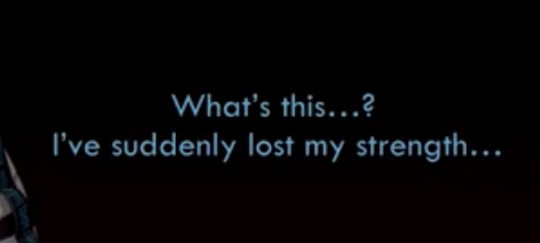
With Milgram’s themes of reinforced and rejected thoughts, I believe the most plausible explanation is a type of mental block instated in the prisoners’ psyches that prevents them from completing actions with the intent to harm or restrain the Guard. (Of course, it’s possible there really is just a magical barrier, but given the results of Kazui’s little experiment and Milgram’s emphasis on altering thought patterns, I think it’s unlikely.) My most pressing question about this is whether the mental block prevents a prisoner from carrying out any action with harmful intent toward the Guard, or if it only stops direct actions.
For example, say Muu wants to hit Es on the head with a rubber mallet. To accomplish this, she comes up with a design for a convoluted mechanism that effectively removes her from the act of wielding the hammer itself. For the sake of consistency, we’ll say the sequence of events is as follows:
Someone tips over a cup. The cup hits a rubber ball, which rolls down a ramp and hits a series of books set up like dominoes, which all fall one after the other. (I don’t have time to do a full illustration right now, but here’s something I sketched out really quick as a visual reference.)

The last book falls off a table onto the pedal of a trash can, which opens the lid and sends a tennis ball flying. The ball knocks over a metal water bottle, which releases the string held in place beneath it.

The string is tied to the rubber mallet, suspending it in midair above a doorframe. Releasing the string also releases the mallet, dropping it directly onto Es, who is (hopefully) standing underneath the doorframe.
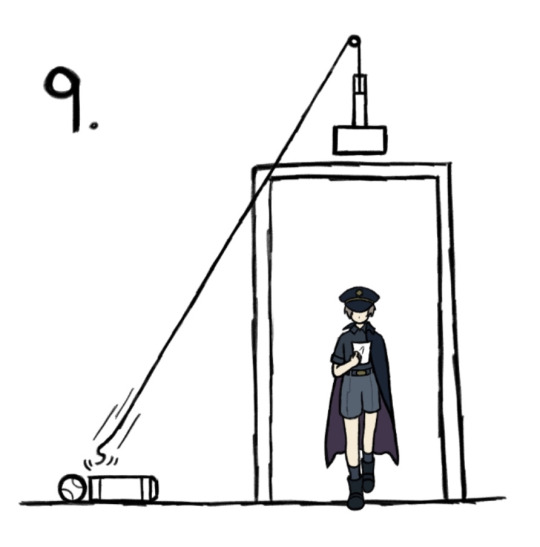
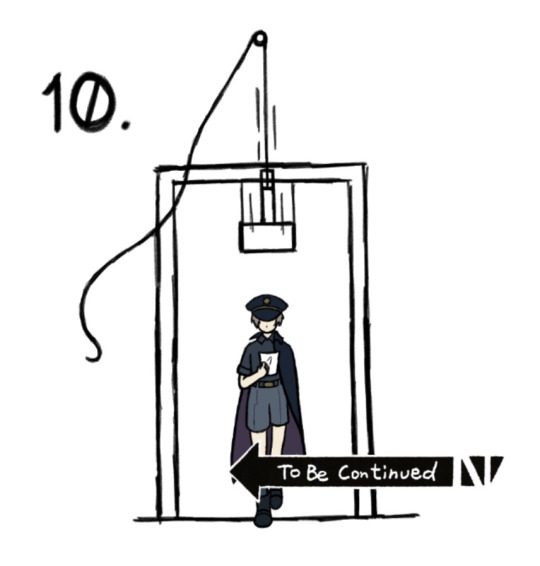
There’s enough steps in the sequence to remove Muu as the one dropping the hammer. However, she would still be acting with the intent to harm the Guard. So, would she be unable to complete the action due to the mental block? If the answer is yes, as I theorize, then this obstacle can be bypassed with another workaround: telling someone else to do it for her.
If she tells Haruka that activating the mechanism will release confetti, and she obscures the mechanism enough that he will be unable to discern the actual purpose, (e.g., covering it with a curtain,) then Haruka would be able to activate it because he is acting without ill intent. Since he is fully convinced that the mechanism will release a shower of confetti, he can activate the chain reaction where Muu would be stopped by the mental block.
This leads to another possible obstacle, though. Would the mental block prevent Muu from building the mechanism in the first place? Since she is making it with the intention to cause harm to the guard, would she be unable to create it? It all depends on just how deep the mental block runs.
Based on what we’ve witnessed so far, I’m guessing that the mental block doesn’t extend quite that far. As seen with Fuuta, Kotoko, and Kazui, (and now Amane as well,) the prisoners are still capable of acting with the intention to harm Es; the mental block just stops them from completing the action. In other words, they can try to punch Es, but they’ll be forced to stop right before hitting them. Similarly, Kazui’s attempt to restrain Es was possible at first, but he quickly lost the strength to do so.
It is likely that Muu would be able to build the mechanism in the first place, but attempting to activate it in order to hit Es would result in either her suddenly losing the strength to do so, or another “invisible wall” where her muscles lock up right before she can tip the cup over.
If Muu lies to Haruka about its true purpose, however, Haruka will be able to activate the mechanism in her stead, and the hammer will successfully hit its mark, provided Es is standing in the right place.
So here’s how they could kill Es with a banana peel…
#milgram#es milgram#listen. i really like digging into the details of how plot mechanics work.#figuring out the rules of a vague convenient power is one of my favorite hobbies.#yes i wrote all this just to end with that punchline.#milgram theory
177 notes
·
View notes
Text
i imagine quite a few followers of mine, over the last few days, have been looking at my blog and wondering to themselves, 'what is milgram, and why won't she shut up about it?'
well, lads, this post is for you.

WHAT IS MILGRAM, AND WHY I WON'T SHUT UP ABOUT IT: a masterpost
milgram is a bit difficult to explain. here's the short version: imagine the popular reality show 'survivor', only instead of real people, it's anime characters. instead of a desert island, it's a magical jail that makes you sing. and instead of an assortment of swimsuit-clad hotties, it's ten highly unstable individuals who have all been, to some degree, involved in a murder. does that clear things up? no?
well, here’s the long version:
a teenager called es wakes up in an eerie, mystical prison, in a guard's uniform, with no memory of who they are or why they're here. the helpful mascot character, a talking rabbit named jackalope, explains that this prison is called milgram, and es is its sole guard and jury. the prison contains ten prisoners, all of whom had committed some sort of murder, although the prison's definition of 'murder' can be a bit loose. none of the prisoners are quite sure how they got there, either, but it's clearly detached from the outside world, and they have no means of contacting anyone from home.
es' job is fairly straightforward. they have to get to know each prisoner, and then decide whether to 'forgive' or 'condemn' them. (this is often translated as voting 'innocent' or 'guilty', but rest assured, everyone is actually guilty. the question is not whether they've committed the murder -- it's whether they're considered justified in doing so.) there will be three trials: for each one, each prisoner will offer their testimony, and receive their verdict. their future in the prison will be affected accordingly.
the prison has a nifty schtick: the prisoners don't testify, exactly. instead, they're connected to a special machine that takes their innermost thoughts, feelings, and memories... and turns them into absolute bangers, paired with epic anime music videos. yes. their fate is decided based on the music video produced by their brain. what happens to those forgiven, and those condemned? well... that will be revealed in time.
that's that for the in-universe setup. in reality, milgram is an interactive multimedia franchise that delivers its story primarily through a series of youtube music videos. the songs are composed by renowned vocaloid producer deco-27 and the videos produced by otoiro. if you're into vocaloid at all, that's probably all you need to know it looks and sounds awesome. (if you're not: i'm telling you that right now.) each character's video has a distinct visual and musical style tailored to their personality, which makes for a very unique and diverse experience. and seriously, all those songs slap.
but the key gimmick is this: es is you. after each character's music video is released, a poll goes up where the viewers can vote to decide whether to forgive or condemn. the majority vote is then canonized, and future story developments will be affected by it.
milgram also explicitly urges you not to vote based strictly on morality. you can vote for whatever reason you'd like. maybe you just find this character cool, and want them to have a good time. maybe they annoy you, so you want them to suffer. maybe you just think this particular verdict would make for some really neat story developments! there's no right or wrong, which makes for some really fun and varied fandom discussions.
another aspect that makes it really engaging to me, is that the music videos -- meant to be the fruit of each character's subconscious -- are rarely straightforward. most of them require some degree of analysis on the viewers' end, and there's no concrete canon explanation provided for most of them. this creates really rich and interesting community discussion! nothing like watching a video for the first time, having no idea what to make of it, and scrolling down to read some passionate fan's frame-by-frame, 5000 word breakdown. it's awesome!
with ten prisoners (plus es, who is not nearly as much of a blank slate as the story would initially have you believe), every fan is guaranteed to find their own little blorbo. each character is incredibly fucked up in their own special way! they're all professionally voice acted and, in addition to their songs, have accompanying voice dramas where you can get to know more about them.
with the first two trials (=seasons) out of three complete, now’s a good time as any to jump in!
OKAY, SO HOW DO I GET INTO THIS THING?
first, a warning: in case that wasn't clear from all the murder, this is not a feel-good series. your favorite blorbo will inevitably turn out to be a horrible person who does horrible things, and will have horrible things happen to them. the videos include, in addition to the obvious violence and murder, themes of abusive relationships, bullying, suicide ideation and child abuse. and that's just off the top of my head.
TRIAL ONE
T1 MUSIC VIDEOS:
you can find every video from the first trial, in order, HERE.
they're all in japanese, and have CC in (just slightly broken) english. this is the main meat of the canon! if you've watched it all and still want more, here's some extra content:
T1 VOICE DRAMAS
the character voice dramas can be found in the single release of each song, on spotify, youtube music, or apple music. here are translations gathered from various fans across the web. (i’m linking both youtube uploads and text-only translations, in case any of the links get taken down due to copyright stuff.)
00. es (video / text) | 01. haruka (video / text)| 02. yuno (video / text) | 03. fuuta (video / text)
04. mu (video / text) | 05. shidou (video / text) | 06. mahiru (video / text) | 07. kazui (video / text)
08. amane (video / text) | 09. mikoto (video / text) | 10. kotoko (video / text)
TRIAL TWO
T2 MUSIC VIDEOS:
you can find every video from the second trial, in order, HERE.
T2 VOICE DRAMAS
01. haruka (video / text)| 02. yuno (video / text) | 03. fuuta (video / text)
04. mu (video / text) | 05. shidou (video / text) | 06. mahiru (video / text)
07. kazui (video / text) | 08. amane (video / text) | 09. mikoto (video / text) | 10. kotoko (video / text)
additional resources
milgram official site & twitter - news & updates (japanese)
milgram en on twitter - additional translations (website updates, character blurbs, comics)
rochisama on wordpress - translations of background text in the videos & character interactions from the official app
@milgrammer - sadly no longer active, but has lots of translations, including character bios, cd dramas, and voice actor interviews
@onigiriico - currently active translator who’s been doing awesome work on the cd dramas
have fun, and happy judgement!
524 notes
·
View notes
Text
Connections Between Novel and Current Milgram
Alright, it's theory time. While it's not confirmed yet, after Kotoko's music video, I am certainly sure that the two novels and our current Milgram are connected. Because their motives fit so well? Maybe some of you know about our "snails theory," right? If not or if you've forgotten about it, please take a look at it too! [in our twitter under the same name] (I must say that some parts of the theory (e.g the voices part) are wrong, but it is a theory after all.) To summarize, we think Haruka, Muu, Shidou, Amane, and Mikoto's beliefs and mindsets come from the first novel, and Yuno, Fuuta, Mahiru, Kazui, and Kotoko's mindsets and their thoughts resemble the second novel. First of all, please do not forget that we are not connecting crimes. Maybe you can see similarities but I, too, believe crimes and storyline different(not completely because of Touchi) from our current trials. This theory is only about mindsets. Well, let's start with 1st novel characters.
Our first prisoner, Gentle. He is a very emotional man to me. And killing a man, who is about to kill a woman. Of course this is pure coincidence but the thought of killing one life to save the others is bugging me. Because of this, I feel like there is a parallel between Gentle and Shidou.
Nervous. Her anxiety of being useless and a failure is similar to Muu actually. Another point that these two have in common is wanting to be appreciated. This desire for acknowledgment adds a psychological layer, suggesting how much external validation influences their thoughts and actions.
Considering that Close and Gentle are siblings, you might think I've lost my mind for what I'm about to say next, but yes, I believe Close and Amane have similar thought patterns. Let's look at the events this way: Close is someone who would do anything and everything to get the person she loves. However, after all the events, she no longer fears suffering. In fact, she wanted to experience pain and didn't seek help. This reminds me a lot of Amane. Maybe in the future, I'll prepare a separate theory for Amane, but I always felt that in that famous electric shock scene, Amane was afraid of pain, so it seemed like she was trying to comply with the rules. However, after her father's death, and of course, when she came to Milgram, she tried not to fear pain and even attempted to surpass the help she received.
The next prisoner, in my opinion, is probably the easiest to connect among all the characters: Two-Face. Initially, I had wondered besides the name, what similarities there could be with Mikoto, but then I realized I had overlooked the most important thing. Both of them were unaware of the consequences of their actions. As you know, Mikoto was completely oblivious to everything. On the other hand, Two-Face genuinely didn't know that what he was attempting could lead to an actual murder.
Our last character from the first novel is Torch. Firstly, when we saw less of Torch's story and mindset compared to the second novel, I couldn't liken him to anyone. However, later, with the release of the second novel, I understood that the reason Torch's (or Touchi's) life was saved was Milgram. Through Milgram, he found the love he had been seeking for a long time, thanks to Sumi. When I look at this child who has no one in his life, I see Haruka. Both are individuals without anyone and in need of love. Additionally, Milgram, who saved Touchi, also saved the first trial Haruka. The lack of self-confidence he had when he first arrived was overcome thanks to Milgram.
Our first prisoner in the second novel: Tatsumi. I might exceed my thread limit before finishing listing the commonalities with Fuuta. First, let's talk about how both perceive their crimes as a symbol of justice. For those who haven't read it, I'll give a brief overview of the common theme in the second novel: all the characters' crimes are based on a kind of murder trend called "justifiable righteous murder." When Touchi asks him what justice means, Tatsumi responds, "Justice is a social media hashtag." Most likely, you've already understood where I'm going with this: both share similar thoughts about the concept of justice. Another shared aspect is that both constantly question the concept of justice they possess.
Rina and Mei, since they share the same trial, I'll continue without separating them. In my previous theory, I talked about how Yuno and Mahiru are opposites of each other, yet still closely connected. The same holds true for Rina and Mei; they are almost opposites, but their attitudes towards all these events are still the same. It's similar to Yuno and Mahiru; Yuno has a very cold personality while Mahiru is the opposite. However, when it comes to Milgram and its rules, both pairs' thoughts align remarkably.
Alright, this was the person I found the most challenging to connect among all the prisoners: Tomonari. Because, honestly, when I first looked at him, nothing came to mind except the word "psychopath." However, if you look at Tomonari's actions, despite all the darkness within, he never tried to kill anyone until the very end, somewhat keeping his "true personality" hidden. You might get upset with me, I know, but I associate him with Kazui. As I mentioned, this theory is not about the crimes they committed. Kazui, too, chose to lie and conceal his true self until the very end of his life. In my view, they are similar because of these choices they made.
Finally, the last prisoner, Mako. First, I can't go without mentioning that, in Kotoko's MV, I saw Kotoko closely following the "Justifiable Righteous Murder" trend created by Mako (even looking at the news of Tatsumi's murder). Both of the characters are individuals willing to kill for the goals they have set in their minds. Additionally, both characters closely follow the workings of Milgram and manipulate it in line with their own interests.
#milgram#(oh god do i just tag them all)#haruka sakurai#yuno kashiki#fuuta kajiyama#muu kusunoki#shidou kirisaki#mahiru shiina#kazui mukuhara#amane momose#mikoto kayano#kotoko yuzuriha#milgram novel#milgram analysis
45 notes
·
View notes
Text
You guys want to hear my darkest prediction for Trial 3? It involves Es and what happens after all 10 prisoners received their final judgements.
Of the 10 prisoners, Yuno, Shidou, and Kazui are the only 3 that have gotten 2 Innocent verdicts. If Milgram operates on a 2/3 verdict decides their fates, even if these 3 are voted Guilty in Trial 3, their previous 2 Innocent verdicts would save them from punishment. It’s the other 7 prisoners who have received a Guilty and an Innocent verdict who’d have to worry about a 2/3 system. If only the third trial verdict matters (because these music videos are supposed to provide the final context for each respective murder), then all 10 have to worry about their third verdict.
The dark theory is more or less based on this: what if our votes don’t matter to Milgram? Milgram has a very black and white view on forgiveness and condemnation. Jackalope has said in both pre-trial videos that they are all murderers in Milgram’s eyes, and he has quipped that if he were in Es’s shoes, he’d vote them all Guilty for the ease of it. The purpose of the Milgram shock experiment was to see how far participants would go to obey authority even if it conflicted with their morals. What if the subject of the experiment is Es, but not in the way we assume?
Discussion of the death penalty under the cut:
This entire time, we’ve been debating and voting on whether we think each murder is unforgivable or not, but we’ve also been growing attached to the characters and Es’s lack of individual personhood has been demonstrated in both trials so far. When prisoners push too close to Es’s past or present responsibilities as Milgram’s warden, we’ve seen Es fall victim to debilitating migraines or fall back into the role of a cold, distant, superior warden.
I think that regardless of Trial 3’s contents, the last song we will hear is going to be sung by Es. It makes sense in a bookends fashion. Milgram started with Es’s song and it will end with Es.
I think that Jackalope is going to tell Es at the end of the third trial that Milgram has sentenced all the prisoners to death, regardless of their verdicts, because of their murders. Es will either have to administer the death penalty, or have the choice to accept the death penalty in their place.
Will Es’s attachment to the prisoners and moral compass prevent them from carrying out the order? Yes. At least, I fucking hope the answer is yes. If Es is going to be forced to administer the death penalty (will they obey the ultimate authority or go against Milgram and try to save the prisoners), I think they would try to race against the clock to help the prisoners escape.
I lean more towards Es having the option of taking their place and accepting the death penalty. They announce to the prisoners that they will be released and when someone asks what happens to them, they will answer that they will die. Es is a pragmatist and when faced with kill one over ten, they will go for the one that saves more lives. Even if Es thinks that some may deserve the death penalty for their crimes, it’s clear that they think some of the crimes committed are forgivable and their integrity will keep them from sentencing them all to death. Es retreats to the interrogation room to die, and the prisoners try to stage a rescue so Es can escape with them. We still get an escape song, just with a rescue thrown in.
#Milgram predictions#milgram es#I come back to my escape song theory#and unfortunately#it’s dark#not very pleasant#but I would love to discuss it#I have a draft of discussing how Milgram revokes Es’s personhood#and even if I’m wrong about this song#I do think we’ll see Es regain their personhood in the third trial#and break from Milgram’s control
22 notes
·
View notes
Text
Post Concerning a Worrying Trend I've Seen
With the start of Amane's trial I think now is good time to voice my concerns about something that is not exclusively about her but is nonetheless very relevant in current events (and I'm probably going to be pointing at her trial most since it's the most clear sign of this).
But something I've noticed this trial, something I'd expected but am nonetheless sad to see, is the heavier sway of people towards Guilty or general harsher methods compared to the last trial.
A brief pause before a continue to reassure people that I am still aware of the difference between fiction and reality, so no, I am not saying that I think people who would punish people in the project would do the same thing in this reality if confronted with it. I'm aware that having the distance of acting behind a screen, seeing these characters through song and art is different than people reacting to the people they see every day. Just so that's out of the way.
But I do also think the difference might be part of the point in a different way, how this extreme environment, voting on prisoners as a warden, in itself is likely to influence people into doing things they wouldn't normally do. It's been talked about how this may (and is) influencing Es, and judging based on some fans' comments, I think those participating in voting are not exempt from the process as they act through Es' role.
Let's go back to Amane, since as I said before, she seems like the most obvious example of this. During the first trial a lot of people who were voting her Guilty were claiming that they ultimately were going to forgive her, that it would be "just for this trial", but that she "needed to learn her lesson". I didn't agree with the rationale even at the time, because I'd already seen from experience why that logic doesn't work. And come trial 2 it didn't, it went badly (albeit not in the way I expected). But that was the rationale people had at the time. And now, come trial 2 a lot of people are suddenly feeling reason to vote her Guilty again. Even after being shown what Guilty means, even after a lot of people being aware that it essentially constitutes to (at least) psychological torture. I've even heard some people who thought she shouldn't have been voted Guilty the first trial rationalizing voting her that way this trial, thinking they "have to", or it'll be "worse" otherwise. And isn't that strange?
Like I said, I don't think people who voting harshly would necessarily treat a child that way in person. I'm aware that most people are voting Amane Guilty would probably say "I'd never hurt a child" and "I'd never psychologically torture a child". And they'd mean it.
Which is why I think it's important to remind people about the name of this project. Milgram. Named for The Milgram Experiment. A psychological experiment where participants were asked to "punish" someone for making mistakes. I won't draw this out by explaining all the details, as I'm aware that most of you already know about it, and I won't talk down to you like that. But the participants weren't particularly malevolent people going in, they were normal people. Just like here. I imagine many of them, if asked beforehand, would probably say "I'd never kill a person". Just how many of those same people went on to administer what they thought would be a fatal shock anyway?
This is a fictional project, yes, but these votes don't exist in a vacuum, and the environment is part of the process. So if you vote, try to think about how you too, are also being influenced.
52 notes
·
View notes
Text
I'm rarely in the tag- So, Star or others basically tell me how it's going in there and like-
All of ya'll sound like you're struggling. What Star told me sounds so stupid. Like this is the weirdest back and forth about nothing I've ever heard. It's impressive how committed everyone seems to be to making the same mistakes. It'd be really nice if more understood Amane's trial happens so late in the game that there's literally no way to change the outcome that's been locked in. Something even made fun of in her voice drama. So, voting based on how one wishes the story will go isn't going to change how it's going.
This is Milgram, after all.
Beyond that, just because someone gives another person their input doesn't mean that person has to take it as we've seen several ways before this with numerous other prisoners. It's ultimately sad because this behavior only sends one message that the abuse and neglect of children is excusable, but how the victims react to that isn't. I don't go into the tag because I've personally seen people literally devolve into doing abuser apologia (going maybe her mom was having a hard time too because of religion and the father being away have you thought of that) and I'm not putting myself through that.
I don't know if people think it's comedic or more humane to make light of the suffering someone was put through by pondering the emotional state of their victimizer or the troubles they could have been going through. But- like I'm too old and too used to hearing this shit to care about this talking point. This may come off as me being stubborn to some, and I can see how others would conclude that. However, sadly, my experiences have taught me that regardless of how bad things get attacking others weaker than you to let out ones frustration is not okay. Just because the person who shot someone is crying doesn't negate the fact they shot someone.
At the same time, it's my personal opinion that if someone does some shit they should be prepared to have that happen to them. One-sidedly hurting others with no consequence to oneself is not okay and never justified in my opinion regardless of if the person doing it is someone's parent/guardian. I don't know; that may be a pretty simple way of thinking, but I feel it's better than going, "Oh, did you ever think her mom was having a hard time, too?"
Because yes, I've thought that of course I've thought that. I grew up in an abusive household, and that is the first thing abusive moms say when they are abusing their children. So, I am incredibly aware of how this fucking works and the statements I've seen on this particularly issue can be retraumatizing to people whom have had these lived experiences.
At times, the things I have been unlucky enough to see and the way they've been discussed have been that to me. So, i can only imagine how people who are younger than me who have gone through these sorts of things or are still going through them feel. This is why even if the discussion around this does not change, it is important to tag this stuff correctly from the start and especially when asked to.
People shouldn't have to reveal personal details about themselves, for this topic to be discussed in a safe and respectful manner. People shouldn't have to be reminded that childhood abuse victims aren't this mythical storytelling device to actually talk about these things with some level of consideration. It's not what people enjoy hearing but individuals who have had the fortune of having parents/guardians or people throughout their lives that don't behave in this manner don't really have the right to tell people who have how they should feel about abuse/abusers.
Simply because it is such a difficult thing for people who have not had it happen to them to wrap their head around. So, they do end up trying to find common ground or an emotional reason that the abuser would act that way towards the person who was abused. However, I can promise anyone reading this that any excuse one can think of has already been used by an abuser and said to the person abused. So, saying stuff like this can easily reinforce that the abuse was justified and the victim deserved it even if that is not the intent of looking into it from that point of view.
This is why most media that discuss abuse try their very best to illustrate how senseless and wrong it is. Something Milgram does. Amane's mom does all this because Amane helped a cat; that's it. Discussing the environmental factors that lead to her mother doing this is giving more benefit of the doubt to her than is being applied to the actual person we're meant to be judging, which is wild. It's difficult for me not to take it as anything other than abuser apologia because no one had to take it there. Literally no one and it shows a flawed understanding of abuse and how it occurs on a societal level.
I am begging read a book, look up information on this topic, and tag posts involving discussing this trial properly. That's all.
17 notes
·
View notes
Note
hey bestie is milgran named after the milgram experiment? my teacher mentioned it in class and all i cld think of was car media
YES IT IS!!! Milgram itself is based on the actions that you (the audience) take towards people who have done something wrong and is imo about whether or not you decide to press the shock button or not and how obedient we as an audience and Es as our vessel for questioning will be in the face of our experimenter, Jackelope.
Also Es is the original word for id, as in the freudian concept :-) which is fun. Tbh the whole series is a love letter to psychology as a subject in a lot of ways! So, yeah it is
4 notes
·
View notes
Note
Now you have to tell me which one of your Milgram ocs you kin! XD
honestly, ALL OF THEM JSKDKLSLSLS. no i really do find all of them extremely relatable (yes even the sanada brothers) and i think all of them have at least one personality trait of mine?
but if i had to choose, i think i'd go with shun, riku and the hunger pair?
shun, because that's kind of a given, mahiru is my strongest milgram kin after all sjsdksklsl (her t2 interrogation made me realize that we're even more similar than i thought too..). um. well, my memory is not great and my brain likes to make me forget about the things that i find stressful, sometimes it's hard for me to tell what's real and what's not and we both like to think of reality as something better than it really is ("I want to forget this boring real world, it's nothing but disappointment. I prefer the fake world I've created in my head"). also i should mention that i relate only to his t1 and pre-milgram version I DO NOT WANT TO HAVE ANYTHING IN COMMON WITH HIS T2 VERSION THAT MAN IS NOBODY TO ME
riku, because, uh. both of us like to put the others' needs first and end up getting angry at both ourselves and others because of that and also ngl i kinda wrote his relationship with his childhood friend based on my personal experiences? riku also often tends to overwork himself and forget about his own health and needs and yeah, i can relate to that. (also fun fact: idk if i mentioned this before, but i remember getting the same mbti type as him before i started getting intp when i took mbti tests?)
and the reason why i relate to the hunger pair so much is mostly because of my upbringing, because yeah, i'm an only child and i'm still kinda spoiled so :'D i'm not a rich kid at all though, but most people assume i am when they meet me?? 😭😭 like, because of my personality and all, like people say that i have this rich kid/royal vibe all the time sdjdsksls and yeah, i share a lot of personality traits with them too
also i kinda kin the third guard
#okay but the difference between our posts is so funny to me.#you were like “oh noa likes books and movies and we also have the same mbti and enneagram so <3”#and i'm like “well my memory sucks also i can't tell what's real anymore and i keep worrying about other people too much AND ALSO-”#IT'S LIKE THAT ONE “open up” “as a child i was forced to eat dog food for dinner” “OPEN THE FUCKING DOOR” VINE I'M SORRY 😭😭#about the third guard. i feel like haruto would either like them a lot OR he would find them annoying#lina's ask box time!#linagram#lina's friends!#friend: aurora! 🌠#edit: ALSO I FORGOT AKIO we kinda have the same mindset and thought process#(which makes me kinning haruka and ichiro so funny like yeah i'm the smartest person on earth but sometimes my brain just. doesn't brain /j
2 notes
·
View notes
Text
Haruka theory and thoughts under the read more! just me going through the MV and voicing aloud some thoughts, let me know what you guys think too!
(*´▽`*)also this is super long i
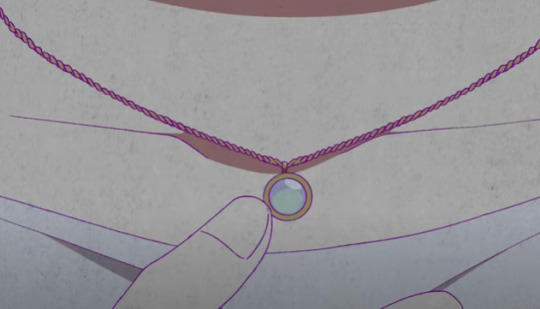
opening scene! the necklace is obviously important to him. also it’s very cute. nothing to say abt this in particular but i just think it’s really cute

love the background choice and how the room looks in general. gives me a big liminal space vibe. i promise i’m getting to actual theorizing in a second here just

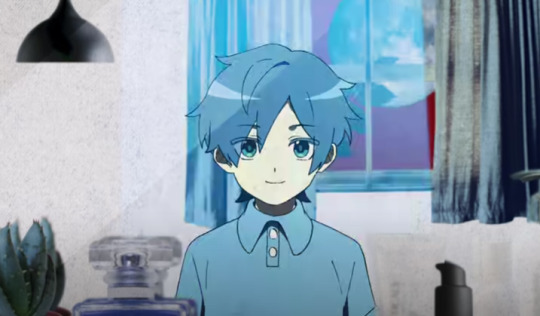
love how the scenery from the window changes when it switches back and forth between him and his younger self (?). i’ve tried searching what the symbolism is of a red sky (if there is any) and i did see that it could mean “the end” or it could be symbolic of danger and what’s to come.

ugh i love the water thing going on. first off, i’m a huge sucker for water imagery and the like and so you KNOW i go gaga for this. it has to be because haruka feels like he’s constantly drowning, like he’s suffocating on his emotions.

i’ve watched this MV at least fifty times and this still gets me upset. pretty obvious that what’s going on here is some form of emotional abuse as well as a co-dependence on Haruka’s part. Haruka clearly has a learning disability and it’s nothing he can control but the people in his life are blaming him for it and so he blames himself, too.
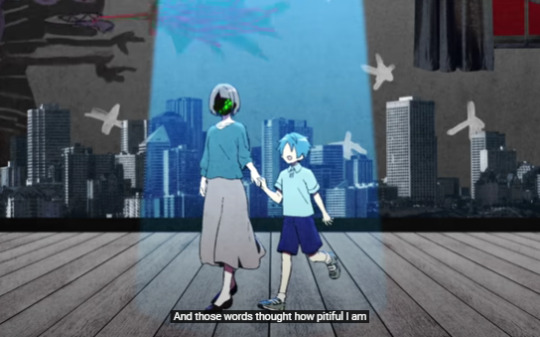
evidence of emotional abuse, being told things like how he’s pitiful or not smart, etc and of course Haruka is going to believe that hence why he’s always calling himself dumb and feeling like when he’s around others he’ll only make them sad because that’s exactly how it was for him at home.
also like how the background is all gray and gloomy and there’s his childish scribbling of a monster (?) hovering over. could be symbolic of a threat to what’s his normal life, like it could end so suddenly
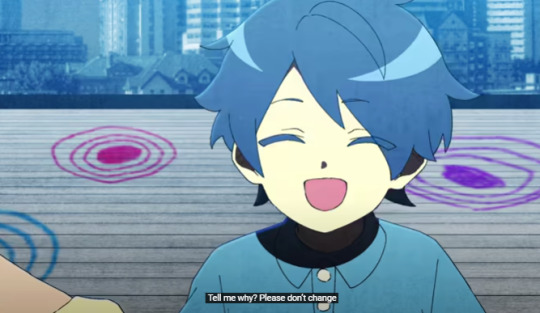
the world around Haruka is changing. his parents are changing (i’m assuming they’re divorced but i don’t think that’s ever made explicitly clear), he’s growing up, but he also feels exactly the same maturity wise. he may be increasing in age but he still is exactly the same and the change is unnerving to Haruka and it’s become noticeable to his parents that he’s not “growing up” and doing “normal” things. his learning disability is holding him back from becoming what’s so normal for society, what’s accepted in society.
so he’s viewed as “weak”, it’s his ‘weakness’. and society eats the weak.

i feel like Haruka’s parents (perhaps namely his mom)(or maybe it was both his mom and his dad but Haruka’s thinking more about his mom because he was closer to her) were becoming fed up with Haruka’s inability to learn what is supposed to be ~oh so natural~ and ~normal~ so they quickly began to get frustrated. also, that drawing behind Haruka appears later i think....

Haruka realizes and recognizes what’s going on and this, in turn, makes him have feelings of self-loathing. why can’t he do what anyone else can? why is everything around him so different but he’s the same? why is he getting taller, having more expectation placed upon him when it’s just too hard for him? Haruka is grappling with these thoughts constantly and it’s making him feel like he’s drowning and no one cares to pull him up out of the water.

i’m gonna be honest, i have no clue what to make of the girl with him at the fireworks but i DO know that the fireworks are really important to him because i recall him answering that it was his cherished memory and he goes on to say the most expensive thing he’s bought was cotton candy and i’ll venture to say that it was at this fireworks festival.

i got nothing to add to this but i just love that line and it is important for you all to know this

are those yellow roses or marigolds? i’m thinking maybe they’re yellow roses which can mean either “jealousy” or “thinking of you”

i could be going off a wrong assumption here, but hey this is all just guess-work anyway... did he accidentally push the girl? and it somehow led to her death or at the very least a severe injury? i’m willing to bet it was more of an injury than death, but even so.

and if he DID push her, now it’s coming to light? like he did that, it was his fault (even if it was an accident, he would no doubt blame himself), and he’s a bad person who is only good for causing harm to others.
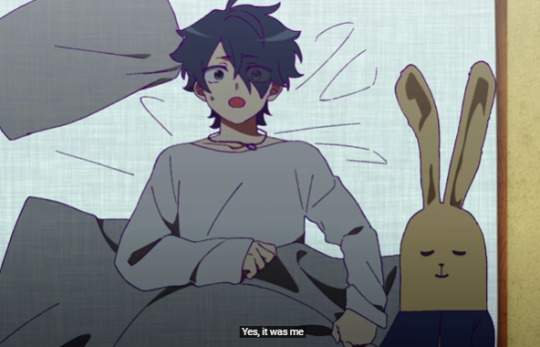
as someone who also sleeps with like five stuffed bunny animals, solidarity between me and Haruka. i want that rabbit it looks so cute
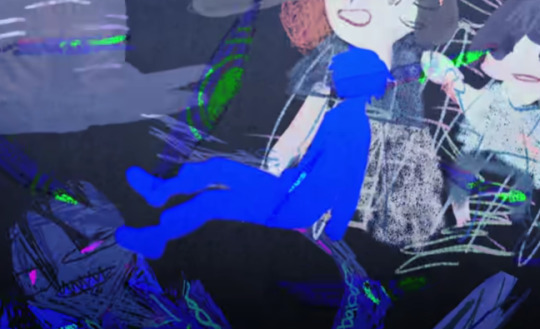
YAA there it is again! i don’t know what the heck it means but there it is!

the dog gives me pause because i’m not entirely sure what to make of it but i DO think this is where it’s important to remind people that the MV’s are based upon the prisoner’s own perception (i think. if i’m wrong, please correct me) and so we’re getting a lot of this from a biased standpoint.

again, emotional abuse that might seem “”””Harmless””””” to others but it’s anything EXCEPT.
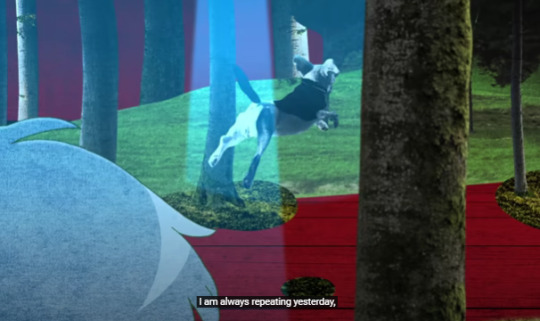
did the dog run away? was he given the dog and Haruka now blames himself for letting the dog run off and perhaps the dog got hit by a car? (;﹏;) i feel like something that’s important is just how much self-hatred Haruka has and his tendency to blame himself for outside factors. i don’t think he LITERALLY killed the dog, but he feels as though he did so it’s become figurative.
also as far as his dislikes being “children” and “animals”, i think he’s jealous of them, maybe? like that could tie into the yellow roses and their symbolism signifying jealousy and envy. he’s jealous of the inherent “innocence” associated with them. he’s getting older, so that “innocence” that’s accepted with THEM is no longer being used with HIM. Haruka has what’s deemed as “childish” interests and i get the feeling he’s made to feel badly about it. no doubt his disability is tied in with this.

there’s those flowers again. and Haruka tries to drown his wants/needs in order to try and “repent” for being the way he is. it’s HIS fault, so he has to think everything is fine even though he’s NOT fine and he’s going to break at some point under the pressure of society/his parents/everything.

Haruka makes an effort to try to understand things in the beginning, but everytime he questions something that’s really ~obvious~ to everyone else he’s met with disappointed gazes and harsh critiques. so he stops trying to understand what he’s apparently ~lacking~ and he stops asking questions because that’s it! he’s dumb! he doesn’t get it so why bother!
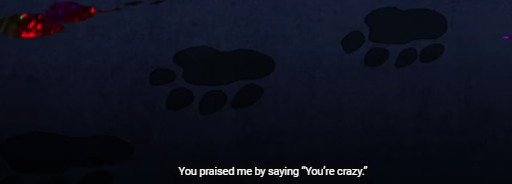

i feel like by this point any praise to Haruka is better than nothing. rather than indifference or being ignored, he’d even rather be called “crazy”. i think Haruka just wants ANY attention be it good or bad - what he hates the most is feeling invisible or as if he could disappear and it wouldn’t matter to anyone.
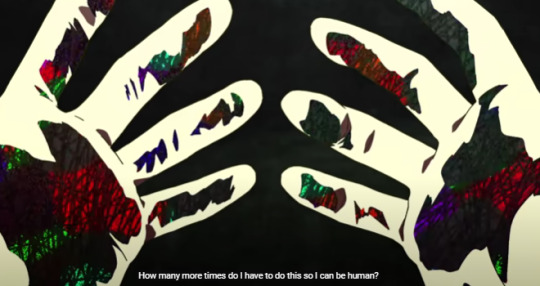
i still feel like the blood on his hands is more figurative than literal and for reasons i’ve already explained so there’s no need to rehash it like i’m trying to meet an essay word count requirement
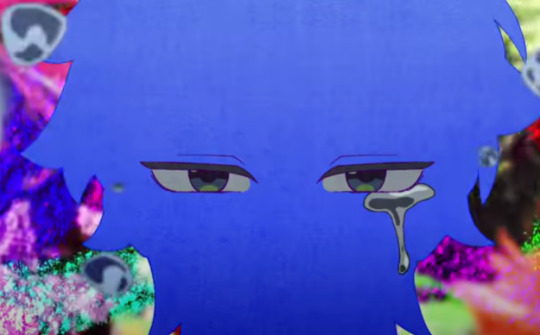
me too Haruka (;へ:)

his feelings of sadness and being unwanted turn to anger onto HIMSELF and it is what snaps the very thin thread he’s been living on
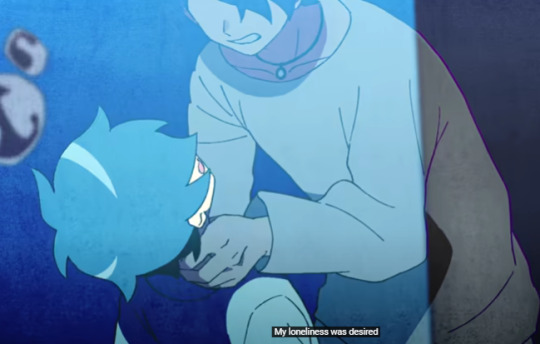
choking himself ties into the water motif we’ve got going on here. the drowning, the suffocation - no longer being able to breathe because everything is broken and it’s unfixable. and he’s the reason why.
i feel like his crime is somehow suicide/attempted suicide but if it IS suicide then i really don’t know how he could be with the other prisoners? unless they’re all dead and this is some form of purgatory or something but otherwise? i don’t know. i just feel like it could be suicide
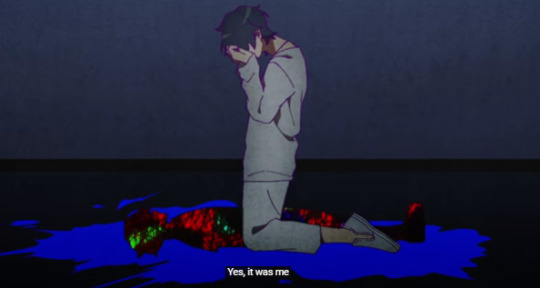
now i will also say this. the puddle of blue surrounding “him” has to be blood and that kind of makes me wonder if i’ve been barking up the wrong tree here but. idk any ideas anyone else has on this would be appreciated and also please talk to me about MILGRAM because i’ve got a badddd obsession
what Haruka wants more than anything is attention and love. he wants love and yet it’s difficult for him to accept love because he doesn’t seem to have any “experience” with love. in the questions asked to him, he doesn’t even seem to really know what “love” actually is. he considers “liking” and “loving” to be the same thing, there’s no difference to him. if he’s getting attention it might not even matter to him because at this point something is better than nothing.
so yes! this is messy. and it’s perhaps even incoherent. if you read this thanks for coming to my TED talk i love Haruka so much. it’s probably become obvious that i’m a little biased bc i relate to him a lot. let me know your own theories too or thoughts on this, i’d like to know hehe (*´▽`*)
#MILGRAM#haruka sakurai#milgram theories#i mention suicide in this as a heads up!#i cant believe i just spent like an hour writing this. hm. i am in deep#i relate to He.... and i love him#i wrote all of this at 3 AM bc i am off my rocker
57 notes
·
View notes
Note
I'm curious about the the mental processes that makes torturers do their work. Is that akin to the process that allowed the "Teacher" to press the supposedly shock-inducing button in the Milgram Experiment? Do they blame their victims for "making them torture them"? Does dehumanisation play a role? What do symptoms look like on a torturer? Thank you in advance.
These are all good questions but a lack of research means it’s difficult to answer them definitely.
I’ll start by saying that the Milgram experiments are a steaming pile of… insults to the scientific community shall we say. Honestly as a scientist the Milgram experiments make me angry because they are just so darned sloppy. They are terrible. They cherry picked data. They applied significant coercion to the ‘teachers’ while claiming they didn’t. They failed to record the ways ‘teachers’ tried to trick the system (especially those who pretended to press the button but did not actually do so).
And they also didn’t bother to check whether the ‘teachers’ believed they were actually administering electric shocks. When a follow up study asked these people about it later they found that the majority of people who pressed the button didn’t believe the button caused electric shocks.
Essentially- Milgram can’t tell us shit about why this happens. Those experiments were too sloppy and poorly conducted for us to draw any conclusions.
So what do we actually have that can tell us about torturers?
There are a lot of interviews conducted by non-specialists; mostly journalists. There are works torturers published. I consider both of these sources useful but biased. Torturers have repeatedly shown that they don’t provide accurate accounts of events or their own actions. So – I take these accounts with a pinch of salt and try to be critical.
When it comes to actual specialists providing notes on torturers- I’ve only really found two sources: Fanon’s The Wretched of the Earth contains notes on torturers he treated after the Franco-Algerian war, and Sironi’s body of work studying torturers. Which is only available in French and is print on demand.
Yes I am still bitter, moving on!
Where does all this leave us?
Well it means that we don’t have enough good quality studies to be absolutely sure. It means most of what we ‘know’ is educated guess work, based on the little bit of research and anecdotal accounts.
It’s frustrating. We need more data. And the result is that most of what I can say here is ‘may bes’.
Dehumanisation probably does play a role, but it may not be as great a role as we tend to assume. Studies of the effects of hate speech in Rwanda in the lead-up to the genocide (along with what we know about ICURE techniques) do suggest that dehumanisation makes atrocities more likely. But they don’t necessarily make torture specifically more likely and many torturers will acknowledge the humanity of their victims.
Some torturers do use language that blames their victims but- not in quite the way you’ve put it here. They don’t tend to say victim’s ‘made them’ torture. Instead they tend to suggest that the victims put themselves in a position where they knew they were going to be tortured.
‘A kid that colour walking around in that part of town at night? What did he expect!’
That kind of phrasing is something I see more regularly.
Another common one is torturers suggesting the victims ‘deserved it’ because of a particular characteristic: ie race, sexuality, gender, homelessness, disability. Arguing that a victim was ‘probably guilty’ or is actually guilty of a crime and therefore ‘should’ be tortured is also pretty common among torturers.
But- I also get the impression that most torturers just don’t think about their victims much. Not as human individuals anyway. They don’t seem to consider the lasting impact they have on other people in any meaningful way.
I think this is easiest to illustrate by looking at the way torturers express regret. Because they do often express regret for what they did.
But it’s not expressed as them primarily being sorry they hurt so many people. Instead it’s- they regret what they did because they have nightmares about it. Because they’re ill and the symptoms are terrible. Because they lost their job. Because they’re socially isolated.
It’s regret focused on the consequences of torture for the torturer rather then an acknowledgement of the scale of harm they caused their victims.
I often get asks that suggest this as an inherent characteristic that ‘makes’ people torturers but there’s no evidence to support that. I personally believe this lack of empathy is an effect of torture rather then something that leads to torture.
I guess what I’m driving at here is that there is a rather selfish focus in torturers. But beyond that symptoms in torturers look pretty much the same as symptoms in everyone else.
My impression, based on the interviews I’ve read, is that unless the subject of torture comes up torturers come across as trauma survivors. Asshole trauma survivors but still trauma survivors.
They tend to be rather convinced of their own importance. I’m unsure where this personality trait comes from but it does seem common. It could be a product of the sub-culture torturers create.
And that brings me more or less to- well the answer to the big question here: why do they do it? How can they do it?
My opinion is that the answer has little to do with individuals and everything to do with organisations.
I’ve said it once, I’ll say it again: Torturers do not work alone.
Torture by it’s definition and nature is a function of groups, of broken systems.
Torturers are not individuals who arbitrarily decide to abuse someone. They are police officers with little training and no funding instructed to ‘do something now’. They are soldiers who’ve been taught over a lifetime that the ‘enemy would do the same to us’. They are teachers told to ‘control the class or else’.
They’re groups of people in an environment that has a huge pressure to produce ‘results’ while also being under trained, under staffed, under funded and unsupervised. Into this already unhealthy mix throw the persistent background cultural lie that torture is a short cut to the results they want.
Hell the persistent cultural message that violence is any kind of answer.
Is it really a surprise that our police turn to torture when we don’t teach them to interrogate and our news outlets, our politics, our fiction is full of apologia telling them that abuse will get them the results they want?
The mindset that let’s torturers abuse other people does rely on assumptions that some people are ‘lesser’ or otherwise ‘deserve’ to be abused. But the bit most fiction doesn’t capture is the social aspect.
The way torturers egg each other on and the way they compete. The way they gradually become more or less the entirety of each other’s social circles. The fear they have of each other, which can trap them in the abusive role they’ve taken on. The way they lose other skills, making it feel impossible to switch. The way they seem to feel that stopping represents both personal failure and letting down the only people they still count as ‘friends’.
The closest I’ve seen a movie come to this was The Shape of Water, the villain brilliantly captured the bizarre mix of self importance, incompetence and intense environmental stress that characterises torturers.
Torturers say that they start because ‘there’s no other choice’. I don’t know how much they believe that piece of apologia.
I do know that in any organisation that tortures there is often incredibly intense pressure to participate in, or at least ignore, torture. Refusal often leads to a person leaving an organisation, sometimes feet first.
But the reasons they continue are complicated. For some of them they probably do believe the apologia, that they’re ‘doing necessary work’. Some of them definitely see their victims as less then human.
All of them are caught in a... societal trap not unlike a cult. They’re isolated from non-torturers. They’re constantly fed the message that torturing is right. They’re threatened if they try to leave.
I think that, whether they acknowledge it or not, the main reason torturers continue is because they know they’re at risk if they stop and they know they’ll be completely socially isolated if they stop.
Of course sooner or later they do stop. It’s completely unsustainable.
When they do they generally report isolation, low self esteem and difficulty functioning in society. They struggle to find and keep work. They struggle to form or maintain relationships. It wrecks their lives; the organisation chews them up and spits them out mangled to a point where they can’t navigate society.
And because they rarely come to terms with what they’ve done they rarely recover.
Availableon Wordpress.
Disclaimer
#writing advice#tw torture#writing torturers#torturers#behaviour of torturers#effects of torture on torturers#torture apologia#effects of torture on organisations
244 notes
·
View notes
Text
Random musings: Could Kirisaki Shidou be an "Angel of Mercy"?
Fair warning I wrote this in a sleep-deprived state. And I am really grasping at straws here.
This theory is founded on three main arguments:
1.) Appearance (gloves, prisoner uniform resembles a lab coat)
2.) Personality (calm and serene prisoner, good with children, it's almost impossible to see him perturbed.)
3.) Teaser quotes ("Throw down. / The invitation that I can't take back/ Lying / replacing with hope.")
What is an Angel of Mercy?
"An angel of death or angel of mercy is a type of criminal offender (often a type of serial killer) who is usually employed as a caregiver and intentionally harms or kills people under their care. The angel of mercy is often in a position of power and may decide the victim would be better off if they no longer suffered from whatever severe illness is plaguing them. This person then uses their knowledge to kill the victim. In some cases, as time goes on, this behavior escalates to encompass the healthy and the easily treated."
- Wikipedia
1.) Appearance:
I find it interesting that Shido is the only prisoner whose prisoner uniform resembles a white lab coat, which is usually worn by professionals in the medical field. It is also interesting to note that he is wearing gloves, which again, is also part of a physicians to-go attire.
I think we can safely assume that Shido works in the medical field based on that description, but wait there's more to it.
It should be mentioned that gloves serve a symbolic meaning as well. In school, we were taught that gloves can be a symbol for dishonesty. Naturally I wanted to check this and came across this definition:
"Often, gloves merely symbolize the Hand itself; usually, however, they signify high status, clean hands, white gloves as cleanliness and purity. They also conceal; they highlight the gestures of the Hand. Gloves embody power and protection, as well as nobility. However, gloves can also be mysterious, often worn by thieves, witches and night-riders. Honor is represented when the right glove is removed."
"signify high status" Okay, if Shido worked in the medical sector, and he was a highly respected member of the society and also well-paid, then he was probably either 1. ) a doctor, 2. ) a surgeon or 3. ) a scientist/researcher. I think we could discard the last one, cause researchers have only limited contact to patients, certainly no contact with children. "Gloves embody power and protection" I think this goes hand in hand with "high status". Thanks to his high status as a famous (?) doctor Shido likely avoided any suspicion and it prevented him from getting caught.
(Random question: Did Shido turn himself in? Or did he get discovered because the bodies were piling up?)
"often worn by thieves, witches and night-riders." AKA criminals.
"Honor is represented when the right glove is removed." There is a picture where Shido puts on his left glove. Is this a subversion? Meaning Dishonor instead of Honor because he put his left glove on instead of removing his right glove (basically doing the opposite?). Who knows. I searched for "left glove symbolism" and got no results. I'm probably grasping at straws with this one.
"white gloves as cleanliness and purity" THIS. Shidou's gloves are not white, although you would expect that from someone working in the medical field. On the contrary, his gloves are black. I know this might just be an artistic choice but since Milgram is known for being obsessed with putting clues into details, I can't help but find this relevant.
Now, what do black gloves mean? They are often worn at funerals = association with death.
"Black gloves suggest bad intentions while handling a situation, evil methods of carefulness to avoid being caught doing something dishonest, criminal-minded self-protection."
I think this fits perfectly.
Shido used to be a doctor who killed his patients. His mild-mannered personality paired with his carefulness and on top of that his highly respected rank, gave him the opportunity to kill multiple people while avoid getting caught.
He's wearing dark gloves to symbolize his corruptness. His hands are quite literally tainted by his sins.
So, yes he's very likely a serial killer.
There's also a quote from Mai & Sunny's blog which further cements this fact:
“I stole someone’s life… Not to mention, so many times to the point where I’ve already stopped counting” - Shido
Hypothetically, in which part of the hospital can one murder patients without arousing suspicion? Answer: Where terminally ill people seek out treatment. Nobody is going to be surprised that they die since sooner or later, they were meant to die anyway.
Alternatively: he did (illegal?) abortions. But that explanation is boring, so I ain't gonna do that.
2.) What do we know about Shido's personality?
We know that he is a calm and serene prisoner. it's almost impossible to see him perturbed. Being able to stay calm and emotionally detached are traits that are required in the medical field. If you want to work in a hospital you need to be stress-resistant and emotionally closed off. Because people you get friendly with can die, and they will die. The fact that Shido manages to keep a cool head after he woke up as a prisoner in the MILGRAM program, proves that he must be quite desensitized to hopeless situations.
If he knows how to comfort the prisoners who lost or killed a loved one, then I'm guessing he must have worked somewhere where people usually die and he has to comfort those who are left behind. So this was likely routine for him.
What else do we know? We know that Shido is good at working with children, but he is also treating those younger than him as children and comforts them when they are distressed. ( Shido is almost 30. In other words he treats Mikoto (23), Yuno (18) ,Futa (20), (basically adults)) like kids. Either he used to work with kids a little too much or he reeeaally likes to play the role of the caretaker.
(I kind of like the thought that Shido worked with terminally ill children (cancer patients?) and losing them slowly took a toll on him, to the point where he experimented on them to find a new cure or he straight up killed them, thinking it was for their own sake.)
3.) Teaser quotes
I think Shido genuinely wanted to help the patients and thought he was doing the right thing. His lyrics "Lying, replacing with hope" indicate that he was concerned about his victims psychological well-being. Perhaps he was telling them white lies: that they would get healthy if they did this or that, or he told them that dying now would be a better option than wasting slowly and painfully away.
Speculation: Could he have come to enjoy the savior role so much that he developed Munchausen syndrome by proxy and declared patients as hopeless cases, even though he could have saved them if he wanted? The Worst case scenario: he became delusional and manipulated his patients results.
Best case scenario: "The invitation that I can't take back" though, makes it sound like the murder might have been Consensual homicide. Maybe Shido went up to the patients and made them an offer they couldn't refuse? And they agreed?
This could certainly tip the scale in his favor. I think Shido has a good chance at being voted innocent. He is the only prisoner begging for the death penalty. I think people who'd hate him for his crime might vote him innocent, because they wouldn't want to give him what he was asking for.
That is to say if my theory is correct.
#shido kirisaki#throw down#milgram#angel of mercy! shido theory#I'm probably wrong but I have a soft spot for this theory
19 notes
·
View notes
Text
I got told what to call this poem by my male colleague
This poem is for all the men
Who have sacrificed their time
To explain my research to me.
In train stations and hallways
At 1am drunk at a party
And over bad coffee after a presentation.
Often knowing no more about my research
Than a title
You have sacrificed your chance to learn
In order to enlighten me to the depth of your knowledge.
Thank you for telling me “it’s all just greed”
When I told you I was researching moral beliefs in finance
Thank you for telling me about the gold standard
And for explaining the plot of The Wolf of Wall Street to me
And that financial crises would not hit people so hard
If they only diversified their portfolios
And thank you for telling me to read Chomsky
And Žižek and Graeber
And all the other Great Men.
And no, I did not know that Paul Krugman had a blog.
Thank you for reminding me to cite your book.
Thank you for the first-year PhD student
Who gave me advice on how to prepare for my viva
Within the first three minutes of our conversation
(Yes, I timed you)
A special thank you to my dissertation advisor
Who, when I told him what I wanted to write about,
Told me about his son’s last holiday abroad
And how his son had told him something interesting
Vaguely related
To my interests
And wouldn’t that be a more interesting topic to write about?
I’m sorry I never went to another meeting with you
And stuck to my topic.
Thank you for giving me a B minus.
I’m sure you weren’t punishing me
Even if the thesis got a straight A from the second marker
And won a distinction when I defended it at a conference.
Thank you to the professor who in the Q/A after my presentation
Informed me that I should not have included
Discussions of the Stanford Prison Experiment
Or the work of Stanley Milgram
In my work on war crimes
I did not know psychology wasn’t a real science
And that it can’t possibly tell us anything
That isn’t completely obvious
To you.
Thank you also to the lecturer from a different university
Who shouted in my ear
In the pub after my presentation
That I had to read the Walking Dead comics
If I really wanted to understand the genre
Because the 12 films in my sample
Were not sufficient
And yes, you were standing very close
But you were a star
And everyone said you were hot
And I was flattered
So I guess it wouldn’t be fair to call you creepy retrospectively.
Thank you also to the professor
Who, at a meeting about what principles should guide universities,
Took care to make it clear that his point,
About a commitment to truth,
Was more important
Than my point
About working conditions.
Because I might have thought that my voice mattered as much as yours
Had you not thought to include the words
“This is the most important thing”
And
“If we don’t have an absolute commitment to truth
(Or was it a commitment to absolute truth?)
All the other details, like working conditions, don’t matter”
I am still not sure what you meant.
But maybe that is just my own financial insecurity
Clouding my judgement and distorting my priorities
And if I were just a white male professor
I could better be objective
And less worried about working conditions
And more committed to absolute truth.
And thank you dear self-described libertarian on twitter
For informing me
That I wouldn’t have such a victim mentality
If I hadn’t decided to do a PhD in unemployment
And yes, extreme virtue-signalling bitter feminazi bitch is a good description of my character
How insightful of you.
Thank you to the young man
Who dropped out of organising a workshop
Based on principles of anti-oppressive pedagogy
Because he disagreed with our decision not to invite a charismatic male speaker
Who he liked
Who would have had so much more appeal
Than me.
Thank you also for the lengthy email explaining
You weren’t interested in taking part in something so niche
That would only appeal to a postmodern crowd
Whereas you were more interested
In getting students excited
About revolution.
Thank you for your feedback.
It was surely helpful in making our event the success it was.
I’m sorry I missed your event with broader appeal
I seemed to have missed the invite for that.
I hope it went well.
Thank you also, of course,
To the numerous men
Who have informed me about the importance of putting class politics in front of identity politics
And that talking about racism or sexism is a distraction
From the real issues
And that wanting to talk about how oppression affects different people differently
Divides the left.
It is a little strange that I never see any of you at the union meetings
Or on the picket line
And I am not sure what class politics are
Beyond shouting at people
But I am sure you are doing good work elsewhere
With your undivided left.
I owe you all a debt of gratitude
And an apology, I suppose.
I am sorry that when we met
All I was good for
Was your assertion of dominance
A canvas for your insecurity
Which is frankly an underutilisation of my skills and my intellect
I am sorry for your stunted growth
For your arrested development
Which made a real engagement between us impossible
And that is more your loss than mine.
And I am sorry
That I will not try harder
To win your respect
I will not seek you out
I will walk away mid-sentence
I will mute you on twitter
And let you shout into the void
Because I care nothing for your approval.
I am done leaning in.
Because there are more than enough
People who will build a community with me,
Which is not built on dominance.
And I am sorry
That you will not have a place in that community
Until you learn that one half of the population
Does not just exist
To listen to you
Explaining their research to them.
By Grace Krause (Source)
2K notes
·
View notes
Note
Thanks to you, I now have an abundance of Psychology-based story ideas involving Anti. Do you know of Lorenz (1935)? He's the guy who got some goslings to imprint on him. I feel like something similar could have happened in MBK if Anti had bothered to treat Dapper properly. It also goes with the fact the incubator goslings went back to Lorenz instead of their mother when he tried to get the siblings to mix.
awww, imprinting!! that’s so cute. yes you’re right that could be a very interesting investigation for Anti. and in fact I would say that Anti did get Dapper to imprint on him, in a sense, in my brother’s keeper.
let’s look at the case of Harlow’s monkeys.
Harlow’s monkeys were experimental primates which had been removed from their mothers near to infancy. As part of the experiment, they were offered one of two options: a cold, robotic “caretaker” dummy with a bottle of food within the baby’s reach, or a warm, robotic “caretaker” dummy which was wrapped up in a nice cloth to provide physical comfort and simulated affection.
the monkeys repeatedly chose the blanket dummy as their preference.
It takes very little comfort to get something to “imprint” if that’s the term we’re working with, and even if you’re not being cared for by the caretaking figure, you can still imprint for the tiniest moment of warmth it offers. Dapper, captured by Anti immediately after his creation, had little choice but to attach to Anti. he was his only source of physical or emotional comfort. and even if Anti only gave the tiniest slivers of it, Dapper would still take it. It’s one of the lower-level reasons he feels so attached to Anti even now after he’s been taken away from him and given another option for his care. If Jackie, Henrik, and Chase were doing nothing but feeding and sheltering him, he would have returned to Anti a long time ago. But a nice hug around the shoulders from Chase and a warm word from Henrik kept him for a while at least.
okay truth be told i’m just trying to show how psychology experiments could be relevant to fanfiction because i think they’re really cool!!! hahaha
for other psychology experiments that could be applied in creepy ways to Anti and the boys, you might consider Seligman’s dogs, Little Albert, and Milgram’s obedience tests.
20 notes
·
View notes
Text
6 Psychological Triggers That Build Brand Loyalty
Most of the choices we make every day are based on how we feel, how we see ourselves and the people around us. The same principle applies to our brand choices.

Brands are no different from people.
The more personal relationship between a consumer and a brand is, the stronger the brand gets and the more loyal the consumer becomes. Your customers are the lifeblood of your business, and their continued engagement and positive customer experience need to be at the constant forefront of your marketing strategy. If they need something, you do your best to provide it and do so in a way that makes the entire transaction positive and memorable. The same goes true for addressing concerns. Both interactions are major factors in your brand’s ability to succeed at building long-term customer loyalty. Smart organizations realize that can make or break a business, yet some still miss big when it comes to how to create those relationships and brand loyalty. A recent study from McKinsey indicated that while it costs five times as much to attract a customer than to keep an existing one, most companies only allocate 18% of their overall marketing focus on retention.
In today’s hyper-crowded eCommerce world, that simply won’t do. Brands that aren’t using modern data-driven technology to inform and empower their retention and loyalty will find it hard to compete.
How to Bridge the Loyalty Gap?
So, what is the reason for this disconnect? The reason for this could relate to a misunderstanding of how companies understand the concept of “brand loyalty”. Customers shouldn’t be seen as a source of revenue but rather a network of mutually beneficial relationships.
Brands that have the best image and retention rates have done the research and collected the data to create an identity to which customers can relate. To do this right, your organization needs to invest in data, specifically, psychographic, and behavioral data, on your customer base, as well as understanding what are the preeminent psychological motivators for today’s modern consumer.
According to a recent study, there are 6 psychological triggers that influence customers to buy what you’re selling. Let’s look at those triggers and how they can be used to promote purchases and brand loyalty for your business.
Psychological Triggers: Reciprocity
To explain the concept of reciprocity, let’s imagine a Saturday afternoon at Costco (pre-pandemic, of course.)
Have you ever found yourself with a mystery spinach dip in your cart that you never intended to buy, simply because you felt a nagging obligation to buy it after you tried a free sample? If so, you have experienced the principle of reciprocity in action.
Of course, online retailers can’t personally visit the house of each person who interacts with them to shove a sample in their hand. So how can you make reciprocity work for you?
Incentives can be a very compelling method of using reciprocity to trigger connection. Tactics like providing a free gift with purchase or giving extra content to those who sign up for an offer or a membership are all great ways to give consumers that extra added push to look deeper at your brand and your product line and begin a relationship with both.
Psychological Triggers: Commitment & Consistency
If you’ve ever decided to quit smoking or lose some weight, you know how stating your goal out loud to others can help keep you “accountable” to achieving your goal. That’s because the principle of commitment and consistency says that people will go to great lengths to appear consistent in their words and actions – even sometimes to the extent of doing things that are basically irrational.
As a retailer, if you can get customers to make a small commitment to your brand (like signing up for your email newsletter), they are more likely to eventually purchase from you. And if you can get products in their hand, even if there is no official commitment to buy them, your chances increase even more.
The online eyeglass boutique Warby Parker uses this psychological trigger to great impact. Warby Parker knows that with a product that sits right in the middle of your face all day, look and fit are important. They also know that if they can get a set of frames in your hands, they are probably about 50% of the way to making a sale. So they make it as frictionless as possible – order the samples, get the box, order the frames you want, and send the box back for free. They say there’s no commitment, and technically, there isn’t. But they also know customers feel a commitment the minute they open the box.
Psychological Triggers: Liking
The concept of liking says that we are more likely to say yes to a request if we feel a connection to the person making it. That’s why the sausage sample lady at Costco is always giving you a nice smile. It’s also why brands hire celebrities to endorse their products – so that people will transfer their love of Kim Kardashian to the clothing she endorses.
There are lots of ways to make this principle work for your brand. Articulating your brand principles and causes your brand is committed to are solid ways to get your customers attention and get them to like who you are as an organization. Modern consumers have an elevated conscious when it comes to corporate responsibility and holding brands accountable for how they govern their space in the world of commerce, so being forthright about causes you’re committed to and how that filters throughout your business can really create a synergistic bond between you and your customers, creating a strong, loyal relationship.
Psychological Triggers: Authority
There have been numerous psychological studies over the past 100 years that demonstrate how humans are conditioned to respond to authority in their lives. Think of the infamous Milgram experiments, in which volunteers were convinced to continue delivering what they thought were incredibly painful electric shocks to unseen subjects, even when they could hear (faked) screams of pain. The presence of a man in a lab coat telling them to continue was enough to earn the compliance of nearly all the volunteers.
While this is an extreme example of the role authority plays in our lives, it does showcase how strongly humans respond to those they see as “experts.” Therefore, it serves to follow that if brands can find ways to position themselves as experts in their field or demonstrate a deeper knowledge on a subject, customers will feel compelled to patronize that brand.
To utilize this trigger, develop ways to highlight content from a resident subject matter expert in your organization. Providing content like “tips of the week” or a monthly selection of products that have been curated by an expert (even one you source from the outside) are all excellent ways to compel people to connect, respect and purchase. Influencer marketing has become a massive force in modern strategy that demonstrates this trigger in action. If a modern style icon tells your daughter which the coolest jeans are to buy, she’s very likely to want to purchase them.
The authority trigger also keeps patrons coming back for more, which is the cornerstone of loyalty. If your customers know they can count on you as a source for expert guidance and knowledge, they will feel inclined to continue to seek out your input and expertise, which forges a solid fidelity to your brand. Know more please visit our blog page : https://www.groupfio.com/6-psychological-triggers-that-build-brand-loyalty/
#how to build brand loyalty#brand loyalty#brand loyalty marketing#what makes a customer loyal#creating customer loyalty#loyalty marketing companies#how to retain customers and build brand loyalty
0 notes
Text
Blog Post Four
Tae’lor N. Moore
05/22/2021
In reexamining Pumzi, I noticed some new themes in the work. Examining Pumzi on a deeper level gave me insight into the world to find both positives and negatives. In this world, the work of natural history is taken more seriously, this is both a pro and a con because even though the work is more valued, it is valued because of a cataclysmic event or circumstance forcing the human race to preserve what little they have. In this world, the administrators of this world more closely mirror cops than they do administrators, since they seem to have the power to sanction and punish with impunity. This fulfills the principals of ACAB, all cops are bastards. This is a leap, yes, but it is important to note the inherent shift in power dynamics when individuals are placed in positions of power. The fact that all individuals, when put in positions that mirror police positions, take advantage of this power. This has been proven by the Stanley Milgram prison experiments where average people got power happy against those they had power over, and began abusing them.
Pumzi administrators seem to have this characteristic and dismissiveness of their subordinate even when the findings of may save or alter the path of the human race. It also begs the question of the dynamic of what Pumzi sacrificing herself was based in. Was it based from sacrificing herself for the tree to survive, or was it more so based in the escape from a tyrannical government and administrative force that removes autonomy and ability from its citizens? This act of resistance can be interpreted as both, either or even neither.
There is definitely more evidence that suggests it was to escape a tyrannical government. The case being how did Pumzi expect the tree to survive without water and someone to care for it in a desert? The main character knows that this tree is as good as dead within the natural history museum or out of it. By leaving with it, she is accepting her fate of dying with it. It is irrational to her to believe that this tree can survive without water, or herself to survive without water. The ending scene was likely an imagined future where people actually cared to bring back the forests rather than accepting life without them- I am not of the opinion that the tree was able to grow and live without Pumzi. She definitely died with that tree in her arms, and with her gone, the tree died as well.
0 notes